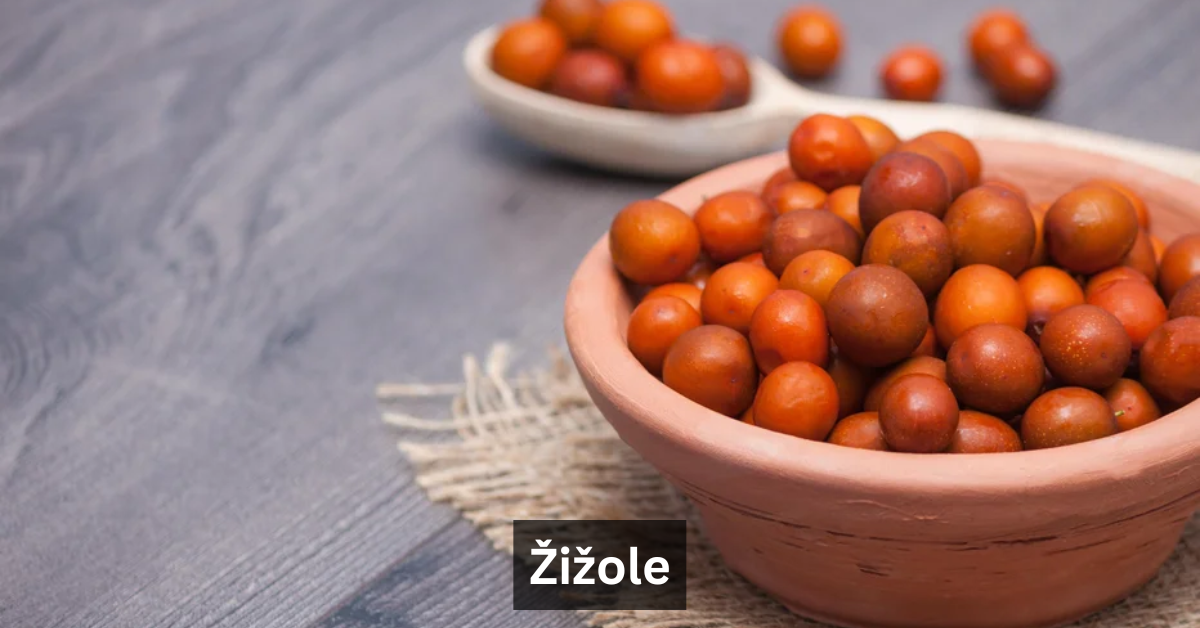When it comes to discovering nature’s hidden gems, few fruits rival the richness, history, and health potential of žižole. Known globally as jujube fruit, žižole are small, date-like fruits that carry a legacy of wellness, ancient traditions, and culinary versatility. These Mediterranean superfruits offer more than just sweetness—they’re packed with essential nutrients, natural antioxidants, and age-old healing properties that modern science is just beginning to appreciate. From the scenic orchards of Slovenia and Dalmatia to traditional markets and herbal medicine shops, žižole are experiencing a well-deserved resurgence as a natural health remedy and a delicious superfruit.
Žižole are reddish-brown fruits resembling tiny dates, with a sweet apple-meets-prune flavor—also known as Ziziphus jujuba. Consumed both fresh and dried, žižole have been a staple in traditional medicine and cuisine across the Mediterranean Basin, Asia, and Eastern Europe for centuries. Today, their popularity is growing fast among health-conscious consumers, particularly for their use as healthy snacks, herbal infusions, and natural sweeteners.
The word “žižole” is derived from regional Slavic languages, and it has deep roots in Slovenian, Croatian, and Balkan culture. In many Eastern European cuisines, žižole are used in seasonal desserts, teas, and tinctures. Their harvest is often celebrated in autumn festivals, symbolizing abundance, vitality, and natural well-being. While these fruits are commonly associated with Slovenia, they also grow throughout the Mediterranean, especially in sun-drenched coastal areas and organic farming communities.
Botanical Profile of Žižole
Ziziphus Jujuba – The Tree Behind Žižole
The žižole fruit comes from the jujube tree, botanically known as Ziziphus jujuba, part of the Rhamnaceae family. This deciduous tree thrives in warm climates with plenty of sunshine and is celebrated for its resilience and adaptability. Its glossy green leaves and thorny branches protect clusters of green fruit that ripen into reddish-brown jewels.
Where Do Žižole Grow?
Today, žižole are cultivated across Slovenia, Dalmatia, China, India, and parts of the Mediterranean. Known for their drought resistance and low maintenance, žižole trees are ideal for both commercial cultivation and home gardening. The Food and Agriculture Organization (FAO) recognizes Ziziphus jujuba as a valuable crop for small-scale farmers due to its hardiness and diverse uses in food and medicine.
Nutritional Value of Žižole
A Treasure Trove of Natural Goodness
Žižole are low in calories yet incredibly rich in nutrients. A handful of dried žižole provides a solid dose of Vitamin C, Potassium, and Iron, all of which are essential for immune support, energy metabolism, and healthy blood function. Unlike many processed snacks, žižole are free from artificial sugars, making them a perfect natural sweetener and sugar substitute.
Phytochemicals and Antioxidants
What truly sets žižole apart from other fruits is its high concentration of polyphenols, flavonoids, and natural antioxidants. These compounds help neutralize harmful free radicals, support healthy digestion, and contribute to anti-aging effects. Their phytochemical profile has made žižole a point of interest in natural health remedies and modern nutraceutical research.
Health Benefits of Žižole
Boosting Immunity and Fighting Fatigue
Thanks to their high Vitamin C content and trace minerals like Iron, žižole are excellent for fortifying the immune system. Regular consumption can help fend off seasonal illnesses, reduce inflammation, and improve cellular repair. This makes them especially useful during cold and flu seasons or periods of physical exhaustion.
Supporting Gut Health and Digestion
The fiber-rich composition of žižole supports gut flora and promotes healthy digestion. Traditionally, žižole tea has been used to soothe an upset stomach and relieve constipation. In modern herbal medicine, it’s valued for regulating the digestive system without harsh chemicals or side effects.
A Natural Sleep Remedy
Žižole has long been considered a natural sleep remedy in Traditional Chinese Medicine (TCM) and Ayurveda. Compounds like saponins and flavonoids found in žižole help relax the nervous system, reduce anxiety, and promote deeper, more restful sleep. Drinking žižole tea before bed is a time-tested way to improve sleep quality naturally.
Culinary Uses of Žižole
Fresh or Dried – Žižole in the Kitchen
Fresh žižole have a crisp, apple-like texture and are often eaten raw or used in salads. Dried žižole develop a rich, date-like sweetness and are perfect for teas, jams, chutneys, or baked goods. Their natural sugars and chewiness make them ideal for creating healthy desserts or energy snacks.
Traditional Slovenian and Balkan Recipes
In Slovenia and Dalmatia, žižole are often used in family recipes handed down through generations. Whether it’s žižole marmalade, žižole liquor, or žižole compote, these dishes carry cultural value and nutritional benefits. The fruit’s versatility means it works well in both sweet and savory recipes.
How to Grow and Harvest Žižole
Ideal Conditions for Growing Žižole
If you’re interested in growing žižole at home, the good news is that these trees require very little upkeep. They thrive in well-drained soil, full sun, and are tolerant of both drought and light frost. Whether in a backyard or an organic orchard, žižole trees offer seasonal fruit and natural beauty.
Harvesting and Drying Techniques
Žižole are typically harvested in late summer to early fall, when the fruit turns reddish-brown. To make dried žižole, the fruit can be sun-dried or oven-dehydrated. This preservation method intensifies their flavor and extends their shelf life, making it easy to enjoy žižole year-round.
:Žižole in Culture and Tradition
Folk Medicine and Spiritual Symbolism
In Slovenian folk medicine, žižole have long been used to treat insomnia, digestive issues, and stress-related disorders. Their calming properties were often viewed as symbolic of peace and emotional balance. Žižole has also appeared in literature and folklore as a symbol of longevity and health.
Religious and Seasonal Significance
Žižole often feature in religious offerings and seasonal festivals, particularly during harvest celebrations. In some regions, žižole are considered sacred and offered during traditional blessings or community feasts.
Where to Buy Žižole
From Farm to Market
You can find fresh žižole in local farmers’ markets, especially in Mediterranean and Eastern European regions. Dried žižole are more widely available and can be purchased in organic food stores, dried fruit markets, or online health shops. Always opt for organic, pesticide-free options for maximum health benefits.
Žižole vs Other Superfruits
Žižole vs Dates and Goji Berries
While žižole shares similarities with dates and goji berries, they differ significantly in nutrient profile. Žižole contains more Vitamin C and antioxidants, making it better suited for immune support and anti-inflammatory diets. Compared to goji berries, žižole are gentler on the digestive system and easier to incorporate into everyday meals.
Modern Products Featuring Žižole
Wellness Beverages, Supplements, and Skincare
As demand for žižole benefits grows, companies are incorporating them into teas, extracts, beauty products, and even žižole-infused beverages. Their anti-aging and anti-inflammatory properties make them ideal for skincare serums, natural supplements, and herbal infusions targeting stress, digestion, and immunity.
Conclusion
Žižole is much more than an exotic fruit. They are a powerful superfruit rooted in history, health, and happiness. With their nutrient-dense profile, wide range of culinary uses, and deep cultural significance, žižole are nature’s gift waiting to be rediscovered. Whether you’re sipping a calming žižole tea, indulging in a sweet snack, or growing your own žižole tree, this ancient fruit has something to offer everyone. Embrace the benefits of žižole and let this natural antioxidant become a cherished part of your life.
Frequently Asked Questions
Are Žižole Safe for Everyone?
Yes, žižole are safe for most people. However, those with allergies to fruits or certain digestive disorders should consult a health provider before consuming them in large quantities.
Can Diabetics Eat Žižole?
While žižole contain natural sugars, their glycemic index is relatively low. Diabetics can enjoy them in moderation, especially the dried žižole, which are fiber-rich and help regulate blood sugar levels.
How Long Do Dried Žižole Last?
Properly stored in airtight containers, dried žižole can last up to 12 months. Keep them in a cool, dark place to retain their nutrients and flavor.
How to Use Žižole for Better Sleep?
Drinking žižole tea before bedtime is one of the most effective natural remedies for improving sleep. Its calming compounds promote relaxation and reduce anxiety.
Stay in touch to get more updates & alerts on Erome! Thank you



